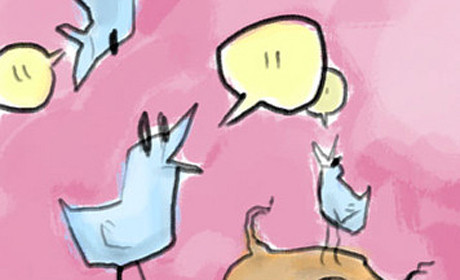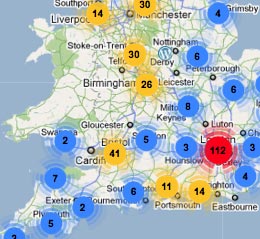
Jeff Jarvis keeping an eye on City professor George Brock. Image: Wannabe Hacks
Journalism is labouring under a business model based on entitlement and emotion, not economic reality, said leading media commentator Jeff Jarvis today at City Unversity’s Sustaining Local Journalism conference.
We need to understand the business model. I’m tired of the argument that journalists ‘should’ be paid, what successful business model was ever built on the word ‘should’?
Virtue is not a business model, just because we are doing good things that doesn’t mean we should be paid.
He said it was a model in need of disruption.
Some of my colleagues don’t like it when I use that term, disrupt. But welcome to the jungle.
We are a business that has to add value to the community in order to extract value back.
Jarvis set out three ways he thought that hyperlocal sites could make money in a difficult market space:
Developing new products and services to sell
Events (he cited US blogs running flea markets and buying club events)
The creation of sales networks
He only elaborated properly on the last of these, saying that individual bloggers are usually too small to interest city-wide advertisers but grouping together in a network can make them much more of a force to be reckoned with. “When it comes to journalism, he said, “we are better off doing things together”.
Philip John, director of the Lichfield Blog, blogged in March about the need for hyperlocal sites to build networks, writing that they bring about “a sort of collective consciousness whereby an improvement to one site is an improvement to all”.
With the likes of Addiply founder Rick Waghorn and Talk about Local’s Will Perrin acknowledging earlier in the day that just turning a profit as a local or hyperlocal blogger in the UK was rare, it was surprising to hear Jarvis talking about local blogs in US cities of 50,000–60,000 turning over $200,000 a year.
Jarvis admitted that is was a hard slog for hyperlocal sites to bring in ad money, but argued that there was a return in building networks. Giving AOL’s huge hyperlocal network Patch as an example, he said Patch was hiring a journalist for each of it 150 sites and paying them $40,000 a year. AOL wouldn’t be doing that if it didn’t think there was ad money there.
Asked whether journalists should be concerned about conflating journalism and sales – a recurring theme of the conference – Jarvis cited the example of Rafat Ali, founder of paidContent, who he said “had to go out and sell the ads at first, but retained his own moral compass”.
“It is probably our job as educators to guide students in these things”, he said, adding that in the end it is all down to credibility, which can be maintained even if a journalist is pitching in with the business side of things. Maintaining credibility is vital, he warned.
“If you lose credibility you lose your value.”
Also from today’s #citylocal conference: Hyperlocal ad sales and ‘the age of participation’
You can see a Chirpstory of some of the best tweets of the day at this link.


 Using data from
Using data from